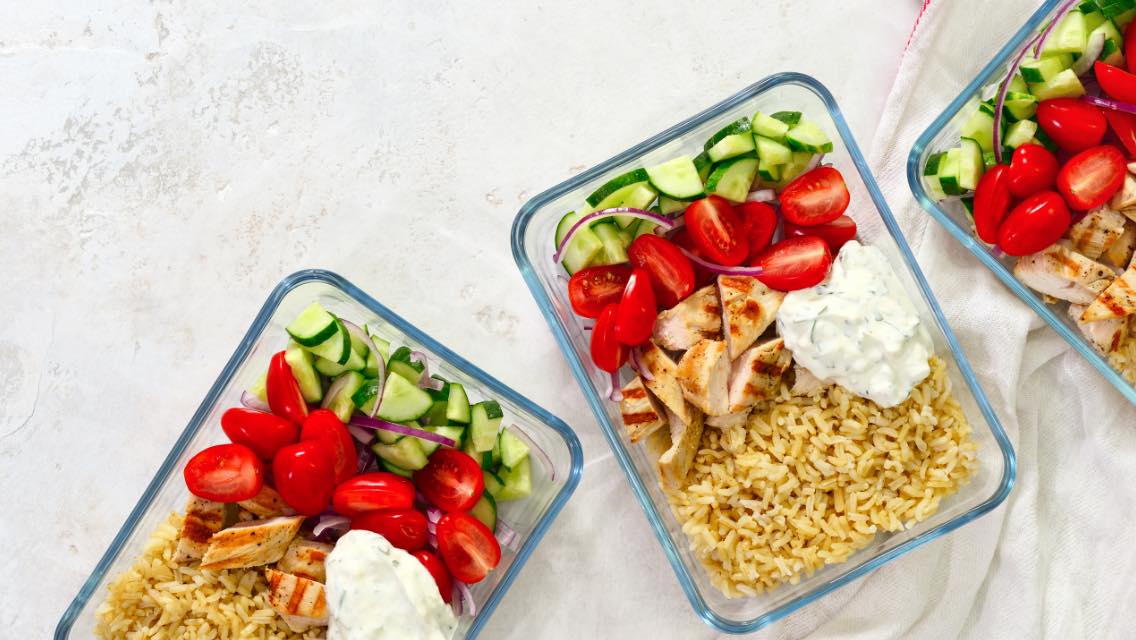“Can’t you just write me a meal plan?”
As the saying goes, if I had a nickel for every time I’ve heard this during a nutrition consultation I’d be a rich, rich dietitian! But I’d also be a guilty and not-so-helpful one if I had given in to making those meal plans.
How so?
For most people, meal plans don’t work. And if I’m trying to help someone reach long-term success with their nutrition and reach optimal health, it’s in their best interest to avoid giving them a measly piece of paper outlining exactly what to eat.
Meal plans are solely a tool, and in the event you are preparing for a fitness show, or a quick and small body composition goal, I might write you up something close. But if you are one of millions trying to figure out how to eat right for your health and/or you have a significant body composition goal, a meal plan can you set up for complete disaster.
Read on to learn my top reasons for why meal plans don’t work and what strategies would be better in place!
Too many habit changes.
Your eating behaviors are habits you’ve been practicing for years or even decades. A new meal plan could contain as many as 100 new habits to master and, for most people, tackling one new habit at a time is enough to chew off.
Think of each preparation step, grocery store purchase and cooking technique as its very own habit to practice.
If you never eat breakfast, and are planning to via the new meal plan, it might be a task in itself just to practice waking up earlier. But now you’ve got to also make something, then pack today’s assigned lunch, etc. This equals too many new things up front.
Instead, I work on one meal at a time with my clients. We might just practice making or preparing breakfast for at least a week before we move on, because there are so many variables and habits to go along with it.
A couple of nutrition sessions could be solely spent on what breakfast looks like in multiple scenarios (traveling versus at home versus workout days) and how-to strategies on cooking, prepping and grocery shopping to support the new changes.
Set up for short term.
Think about it.
Are you really going to follow that meal plan, verbatim, for the rest of your life?
Most of the meal plans I cross paths with are written for a day, week or at most, month. Essentially, the short meal plan is just providing the fish versus teaching the person how to fish for themselves.
What happens when holidays come or you get bored with the choices? Or when the season changes, and those blueberries assigned at breakfast no longer are as appealing and cost double because they aren’t in season anymore?
There’s more than one way to get things done.
Meal plans lay out one way to do things, often not explaining that there are hundreds of substitutions for each of the foods and macronutrients (fat, carbs and protein).
I can’t tell you how many times I’ve seen the same meal plan circulating around. You know, the one that has oats and egg whites for breakfast, fish and green beans for dinner, etc. Sound familiar?
Instead, I coach my clients to first understand the macronutrients, carbohydrates, fats and proteins and learn which foods fall within each one of those groups. If we can then outline their likes and dislikes and figure out how to balance the different macronutrients at each meal, there are unlimited possibilities for them.
They won’t get in a rut or think they can’t deviate from the plan.
Don’t make the best use of your ingredients.
Especially with produce.
Has this ever happened to you? An assigned meal calls for you to eat a 2-cup side salad with dinner, but then the rest of the week goes by and the remainder meals don’t use that spinach/lettuce in your fridge, so it goes bad and is wasted.
It’s better to assess and learn different ways to prepare foods to your liking. That way you can appropriately plan and purchase the right amount of foods each week.
You might have extra meatloaf from dinner that you’d prefer to utilize for lunch the next day, or you might repeat a dinner later in the week because it was so good. It’s better to “meal plan” for yourself and your family based on how fast you utilize food.
My end goal for my clients is to have them be able to look in their own fridge, and instead of thinking there is nothing to eat, be able to quickly come up with a meal based on the ingredients they have.
Because you know what to eat.
I’ve found my role as a dietitian to be much more valuable when I help people strategize how to eat right, versus just telling them what to eat. Although many of us have acclimated to a highly processed and non-healthy diet, we don’t eat these foods because we think they are better for us; they are just more convenient with our lifestyles.
Working with a nutrition coach or dietitian is much more valuable when you are working on strategies to overcome your obstacles to eating right versus just having them tell you what to eat. Although you are in the driver’s seat, choosing someone to coach you on how to do things will better empower and enable you to be a better driver.
So, if meal plans aren’t the answer, what should I do?
Tell yourself you don’t need a meal plan, but you would benefit from nutrition coaching via a Dietitian or Nutrition Coach to help identify and practice strategies to help you overcome your obstacles. Not only can they provide you with the most up-to-date information on foods and their preparation, but they can also help you design the best plan of attack for yourself.
Once you assess your current nutrition personality, together you can highlight the best changes and strategies to start with based on your confidence level and do-ability.
Every person is completely different as far as “what” their obstacles are to eating right, whether it is a need for more education on healthy eating, lack of knowledge on cooking and preparing foods, etc. The goal is to make eating healthy work for you and your lifestyle.





